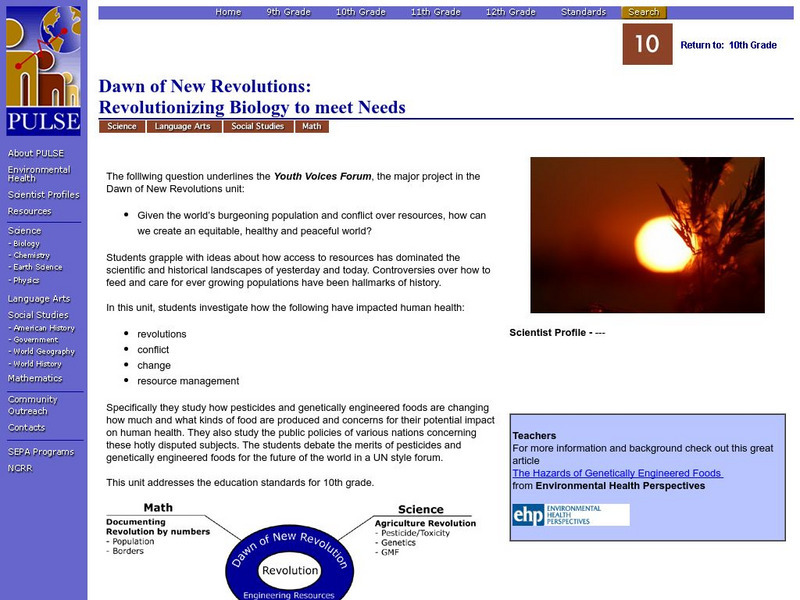eSchool Today
E School Today: Your Cool Facts and Tips on Genetic Engineering
Explains a basic concept in genetic engineering, i.e., the genetic modification of living things. Describes how it is done, how it differs from cloning, the benefits it offers, and the concerns people have about this practice.
Popular Science
Popular Science: Something Funny Down on the Pharm
This article investigates the growing industry of pharming, or genetically engineering and growing crops in order to produce pharmaceutical drugs. While there is huge potential for this industry, the article concentrates on the...
CK-12 Foundation
Ck 12: Life Science: Biotechnology in Agriculture
[Free Registration/Login may be required to access all resource tools.] The majority of the corn in the United States is genetically engineered. Corn syrup is used to sweeten many things, like Coke. Corn is also fed to the cows. Learn...
PBS
Pbs Learning Media: Engineer a Crop: Transgenic Manipulation
You're the geneticist now. In this interactive feature developed for the companion Web site for NOVA/FRONTLINE: "Harvest of Fear," use the latest in genetic technology to engineer your own "supercrop" of tomatoes.
Other
Ota: Genetic Engineering and Agriculture
A Q&A published by the Organic Trade Association (OTA) about genetically modified organisms (GMOs). This page expresses many doubts, concerns, and assertions about the use of GMOs in agriculture.
PBS
Frontline and Nova: Harvest of Fear
Review the risks, benefits, hopes, and fears associated with biotechnology and bioengineered food crops. Find in-depth interviews with genetic scientists, food industry representatives, farmers, and critics of biotechnology. Accompanying...
TeachEngineering
Teach Engineering: Dna Forensics and Color Pigments
Students perform DNA forensics using food coloring to enhance their understanding of DNA fingerprinting, restriction enzymes, genotyping and DNA gel electrophoresis. They place small drops of different food coloring ("water-based paint")...
PBS
Pbs Teachers: Scientific American: Dragon Science: Food for Thought
Investigate how geneticists use selective breeding to capitalize on hybrid vigor by using colored chips to represent traits in succeeding generations. Use Explain why farmers must buy new hybrid seed each year.
University of Arizona
Pulse: Dawn of New Revolutions
A cross curricular unit focusing on how much and what kinds of foods are produced because of pesticides and genetically engineered foods. Students will investigate the impact on humans due to the new technology in food production. Topics...
PBS
Pbs Teachers: The Real Dirt on Farmer John: Family Farms in America
Trace the evolution in American agriculture with this interactive timeline. Learn how the history of one small Illinois farm reflects the larger changes, decade by decade.
Other
Dna for Dinner?
This WebQuest is designed to help students answer the question, "Should genetically modified food crops be specifically labeled for consumers and why? In answering this questions students will also draft a law and explain their...
PBS
Pbs Teachers: Technology and Ethics
Investigate the meaning of ethics and morality as applied to technology and scientific advances. Research various issues related to scientific, technological and medical advances in the past decade and take a stand on each.
Genome British Columbia
Genome British Columbia: Terminator Technology for Gm Crops
In 1998, American scientists developed terminator seeds which grew into plants that were unable to reproduce. While this practice prevents the dangerous flow of genes to the wild, it has some disadvantages, for example, the added expense...
CK-12 Foundation
Ck 12: Life Science: 3.21 Agriculture
Learn how biotechnology can alter crops to change many different phenotypes of plants.









